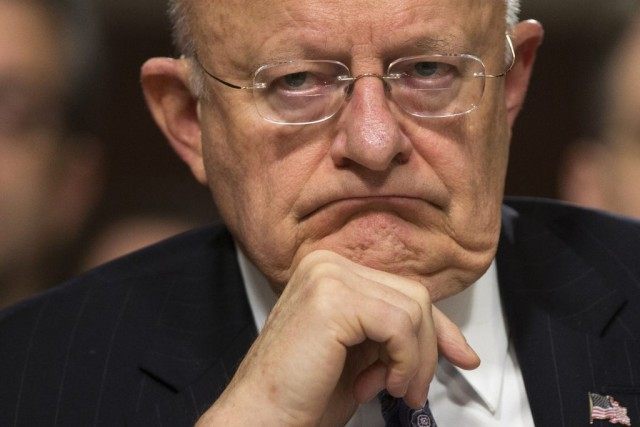WASHINGTON (AP) — The Latest on the worldwide threat assessment from U.S. intelligence agencies (all times local):
11:05 a.m.
Director of National Intelligence James R. Clapper is telling the Senate Armed Services Committee that the U.S. is facing the most diverse global threat environment he has seen in more than 50 years of government service.
He delivered the annual assessment by U.S. intelligence agencies of the top dangers facing the country.
Clapper says the array of threats and challenges around the world is the result of the collapse of what he described as the “bipolar system.” Russia and its alliance on one side and the U.S. and its western allies on the other provided a level of stability that is now gone.
“And virtually all other threats were sort of subsumed in that basic bipolar contest that went on for decades and was characterized by stability,” Clapper said. “When that ended, that set off a whole range of … dynamics around the world that have changed.”
___
10:20 a.m.
Clapper says Russia’s aggressive military intervention in Ukraine and other moves could put Moscow and the U.S. “into another Cold War-like spiral.”
Clapper says Russia’s actions are intended to demonstrate, in part, that Moscow is a superpower, co-equal to the U.S.
“I think the Russians fundamentally are paranoid about NATO,” Clapper said. “They’re greatly concerned about being contained and are of course very, very concerned about missile defense, which would serve to neuter what is the essence to their claim to great power status, which is their nuclear arsenal.”
___
10:05 a.m.
President Barack Obama is reassuring the leaders of South Korea and Japan that the U.S. will defend its allies following a worrisome rocket launch by North Korea.
The White House says Tuesday that Obama spoke with South Korean President Park Geun-hye (goon-hay) and Japanese Prime Minister Shinzo Abe (shin-zoh ah-bay) on Monday evening. Obama is condemning the North’s rocket launch and calling it a flagrant violation of U.N. Security Council resolutions.
The leaders are calling for a strong global response including a new Security Council resolution.
The diplomacy comes after Pyongyang launched a rocket it says was solely to carry a satellite into orbit. The U.S. and others worry it was a cover for a long-range missile test.
South Korea and Japan are both U.S. treaty allies.
___
9:55 a.m.
Clapper tells the Senate Armed Services Committee that North Korea has expanded a uranium enrichment facility and restarted a plutonium reactor that could start recovering spent fuel in weeks or months.
Clapper says in his opening statement that Pyongyang announced in 2013 its intention to refurbish and restart nuclear facilities, to include the uranium enrichment facility at Yongbyon and its graphite-moderated plutonium production reactor, which was shut down in 2007.
___
9:43 a.m.
Clapper says Islamic militants will continue plotting against U.S. interests overseas and homegrown attacks will pose the most significant threat to Americans at home.
He says the perceived success of attacks by homegrown violent extremists in Europe and North America — such as those in Chattanooga, Tennessee, and San Bernardino, California — might motivate others to replicate the attacks. That would diminish the U.S. ability to detect terrorist operational planning and readiness, he said.
Clapper also said Iran remains the top state sponsor of terrorism and al-Qaida-linked groups remain resilient. He said the U.S. will continue to see cyber threats from China, Russia and North Korea.

COMMENTS
Please let us know if you're having issues with commenting.